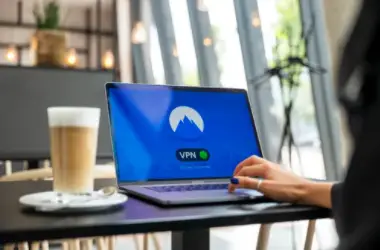ExpressVPN vs NordVPN
When it comes to choosing the best VPN for your needs there are two names which come up a lot in conversation: NordVPN and ExpressVPN.
Both are seasoned providers with excellent services to offer. So, with so many features for both, which one is the best?
It truly does depend on your needs. ExpressVPN is the fastest but you may consider NordVPN the better value. We’re going to need to assess your SPECIFIC needs to answer this properly.
In this article we will aim to do exactly that. We’re going to take a closer look at the important features of both VPNs so that we can give you the facts when it comes to how each measures up when it comes to speed, privacy, security, and more.
This should clarify the best choice as we intend to cover an obscure fact or two that you might not have known about that is a dealmaker or breaker when it comes to YOUR personal VPN.
Without further ado let’s compare these contenders… we bring you NordVPN vs. ExpressVPN!
Speed

Everyone’s first concern when it comes to VPN is the same. How fast is it?
Being able to access geographically locked content or securely access your email does you no good if it takes forever to load. So, how did our contenders rate?
ExpressVPN is quite fast. Connections to the U.S. and the U.K. were the fastest, beating out NordVPN for a range of 1-5 extra mbps, though both were quite fast and you might not notice the difference overmuch, depending on your intended use.
Connections to Asia were noticeably faster with ExpressVPN at 30mbps vs. NordVPN’s 13mbps.
We did find some exceptions, jumping around NordVPN’s servers, but overall performance was definitely better with ExpressVPN.
ExpressVPN wins in the speedtest.
Unblocking capabilities
When it comes to unblocking content, both VPNs perform well, but ExpressVPN definitely has the edge.
On their website they promise to not only unblock services such as Netflix, BBC Iplayer, Amazon Prime, and more (25 services total, actually), but testing appears to confirm their claims.

ExpressVPN connects seamlessly to these and other services and their support staff is ready to help 24/7 should you have any issues.
By contrast, NordVPN performs admirably as well, connecting 10 out of 10 times when it comes to Netflix.
BBC Iplayer was a different story, however, and our experience was very hit and miss, forcing us to try different servers in order to finally access content.
NordVPN does not have a ‘service list’ which they promise, rather relying on the broader claim to ‘keep you connected to your favorite websites’, so while they also provide excellent support we have a little less confidence for unblocking content since no claims are made on the website.
That said, while both can connect and unblock geographical content for a number of sites and services, ExpressVPN gets the win for performance and for ‘putting it in writing’.
Servers and cities
A larger network means less annoyance for you when you are connecting during holidays or ‘rush times’, as well as when accessing content across the globe. So, how did these two rate?
ExpressVPN has a server network which consists of over 3000 servers spanning 94 countries. NordVPN offers more than 5000 servers, but distributed throughout 64 countries.
ExpressVPN wins for their wider distribution but with a caveat, for U.S. and UK connections where both companies concentrate their most servers, NordVPN has the edge.

Overall Security and Privacy
For many users privacy is a BIG concern, if not the biggest, and both companies provide a measure of this.
When it comes to logging, NordVPN takes the lead. Located in Panama, they are able to enforce their zero-logging policy while ExpressVPN, situated in the British Virgin Islands, never actually promises one.
There is a limited amount of logging that they perform, along the lines of which server you are using and how many devices you are using.
The UK and the U.S. do not have any authority to compel ExpressVPN to release any information without going to the British Virgin Islands high court.
By contrast, NordVPN had a security audit by Price Waterhouse Cooper which confirmed their ‘no-logging’ policy in 2018.
Aside from privacy concerns, how do both rate for security? We should note at this time that NordVPN suffered a hack in 2018 which they blame on a server configuration error.
This has since been remediated (and interestingly enough their no-logging policy made it a chore for even them to track) and while it has not recurred ExpressVPN is, thus far, hack-free.
For personal privacy and safety when connecting from a coffee shop or internet café, NordVPN offers an AES 256 GCM encryption and a constantly changing 3072 Diffie-Hellman key that helps to ensure that if your first level of defense is penetrated then the attacked is met with a second one.
ExpressVPN uses an AES 256 CBC along with a Hash Message Authentication code that prevents a message from being altered in-transit.
Like NordVPN, for ‘perfect forwarding’ a key is assigned to you when you login and it is also replaced every 60 minutes.
As far as protocols, ExpressVPN offers OpenVPN UDP, OpenVPN TCP, L2TP – IPSec, IKEv2 and PPTP, while NordVPN offers only OpenVPN and IKEv2/IPSec.
NordVPN has an extra goody that you might not be aware of which ExpressVPN does not. This is a little feature which they call ‘VPN over Onion’.

Through this, your traffic is first routed through NordVPN’s servers and then through an Onion server before arriving at it’s destination.
This is a big deal as far as privacy as this is virtually untraceable (unless you are really going out of your way to irritate a particular nation or a super-rich corporation, and even then it will depend on the care which you have taken).
While the VPN over Onion method is significantly slower, NordVPN also offers another means of obfuscation through a double VPN system, which can bounce your missives through two VPN servers rather than one should you choose to employ it.
Lastly, when it comes to payment options to REALLY keep things private, NordVPN excels, accepting the anonymous payment options of Bitcoin, Litecoin, Ripple, Gridcoin, Ethereum, Zcash, Dash, and Monero. ExpressVPN currently accepts only Bitcoin and Mint.
Despite the 2018 hack, our judgment call is that NordVPN wins the Security and Privacy trophy for its diversity, true zero-logging, and the special attention given for Tor users.
Special Features
Both services come with some extras that may or may not be a deciding factor for you. For instance, ExpressVPN comes with ‘split tunneling’, which allows you to decide which applications will be using the VPN.
If you are streaming, for instance, you can set Netflix to use the VPN and connect normally with everything else. NordVPN does not, unfortunately, have this feature.
When it comes to torrenting, both support torrenting, with ExpressVPN providing special servers for it (though not actively mentioning torrenting so much on their website), whereas Express VPN does not have any special torrent servers but openly states that torrenting is supported and provides a fast connection for it whenever you connect.
oth have free browser extensions that help to protect you from rerouting and malware, though ExpressVPN has them in more available languages.
One unique feature to ExpressVPN is that you can flash a system with their firmware to create your own router and count it as one of your covered devices.
This is extremely cool for those techies out there that fancy their own router and NordVPN doesn’t offer something comparable to this.
For special features we are going to have to say that ExpressVPN gets our vote as the winner.
Cost and Value
From a cost perspective these two are fairly close on the month to month, with NordVPN starting at $11.95 per month and ExpressVPN at $12.95. Where you get a difference is the longer subscriptions.
At a 1 year plan, NordVPN comes to $6.99 per month whereas ExpressVPN only goes down to $9.95 per month.
ExpressVPN goes as low as $6.67 per month if you opt for a 15 month subscription and that is as far in the future as you can subscribe.
NordVPN, however, has a 2 year and a 3 year plan, which offer $4.99 and $3.49 per month respectively and considering their close speeds we’d have to argue that you are getting a lot more value from NordVPN unless your only concern is that extra 5mbps in your downloads or if you need a server placed somewhere more obscure than NordVPN might provide.
Both accept a number of payment options although NordVPN annoyingly does not accept Paypal. Despite this, for overall Cost and Value we’re awarding the win to NordVPN.
Devices covered
Your subscription to ExpressVPN comes with the ability to connect 5 devices simultaneously. NordVPN grants you 6.
That said, with the previously mentioned feature of being able to firmware-flash your own router, you could arguably squeeze a little more out of ExpressVPN although for most this coverage is going to be quite adequate in both cases.
As most are not going to implement their own home router we’re going to say that 6 simultaneous connections trumps the 5 and give the win to NordVPN.
Customer Service
Customer service is actually a strong suit for both providers, with 24/7 chat support available as well as email support for those who wish to ask their question and avoid potentially tedious interactions on simple questions.
The chat client for Customer Service with Expressnet connects faster on average although not so much that it’s a dealbreaker.
Where they differ the most is in the quality of their responses. NordVPN was great at providing quick answer, however, they are quite formal and what seems like a ‘cut and paste’ response is what you get.
While it’s typically the response that is required, they didn’t offer the same level of interaction that ExpressVPN provides, so for a warmer customer service experience through the chat ExpressVPN has a definite edge.
That said, if a cold response doesn’t bother you, NordVPN provides their answers in a fraction of the time and they are pretty spot-on. This one is largely going to be a matter of your own personal preferences.
Email support is where we noticed the biggest time differences, with ExpressVPN answering emails within a 1 hour period as opposed to NordVPN’s turnaround of 4 hours.
This can be a frustratingly long amount of time if you have an important issue and cannot access the chat (neither service offers phone support, sadly), so we are going to go with ExpressVPN as the winner when it comes to good Customer Service.
Conclusion
Now that we have broken down the offerings of both services into a number of easily-digestible categories we hope that your choice is now crystal-clear.
If you are using the VPN primarily for streaming, unblocking services, and downloads, then ExpressVPN has the majority of wins when it comes to overall features and services.
If, however, your primary concern is your privacy then NordVPN offers a comparable list of services, excellent (if slightly lesser) speeds, and anonymous payment options with a deeply discounted price for longer subscriptions.
Whichever VPN you choose you can rest assured that you’ll be getting an excellent value and we hope that you enjoy your new VPN!
FAQ – ExpressVPN vs. NordVPN
1. Does your ISP care if you use a VPN?
VPN technology is actually quite common, being implemented first by corporations as a means of accessing company data from securely from mobile devices.
As such, your ISP is not going to care if you decide to use one and as a bonus, it may even improve your speed with torrents and other applications.
This is because many ISPs have a habit of ‘throttling’ traffic, often during busy times (after the 9 – 5 workday, most commonly), and they do this by noting when you access resources that they view as bandwidth intensive.
By hiding yourself in a VPN the ISP doesn’t know what you are accessing and therefore cannot throttle you for it. It’s well-worth the investment.
2. Are VPNs illegal?
No… in most countries. In some countries they are banned or regulated.
Examples include the UAE which has implemented Cyber-security laws that can hit you with enormous fines and possible felony indictment if you are considered to have performed illegal activity while using a VPN.
Check the local laws of your country before using one and don’t forget that movie downloading, if not through Netflix or another licensed service, is considered piracy and countries like the UAE could technically charge you accordingly.
3. Can a public WIFI provider see my history?
While they cannot see what you are doing, due to encryption traffic, a WIFI provider CAN know what pages that you have visited.
They are also privy to how much time you have spent on a particular page but they will not be able to see the private data which you have entered in it.
With a mobile device they can also see what apps you are using and how long you have used them, and even messaging if it is not encrypted along with who you messaged and from where.
With a packet sniffer they can even steal your passwords or attack you with malware. If you use a VPN, however, this is not the case.
This is because the VPN will assign you a new IP address and through the VPN encryption your information will be hidden and protected.
The WIFI provider has no way of knowing who is using the IP and would need to breach the WIFI security protocols to observe what you are doing and some VPNs have military grade encryption.
The odds are, unless you are at an internet café in the Pentagon, no one is going to be spying on you through private WIFI if you are using a VPN.
4. What happened with the NordVPN hack?
On March 20, 2018, a NordVPN server breach was remediated that was accomplished through a third-party data center account (and not an account managed through NordVPN).
This compromised a single VPN server located in Finland and the breach occurred approximately sometime between January 31st and March 5th.
The reason for it was cited as a poor configuration on the part of the data center for one server.
NordVPN has advised that while no user data was stolen that they were not notified of the breach by the data center until one year later, in April of 2019.
NordVPN would not report the breach for another 6 months, stating that ‘it takes time to investigate 5000 servers”.
As this server was not a part of NordVPNs central infrastructure we can happily report that user data such as credentials, billing, and profile details were not compromised in the attack.
There was, however, potential that unencrypted traffic could have been monitored but NordVPN advises that configuration changes would have been required that were not implemented at the time of the attack.
No further successful breaches have been reported at this time.

